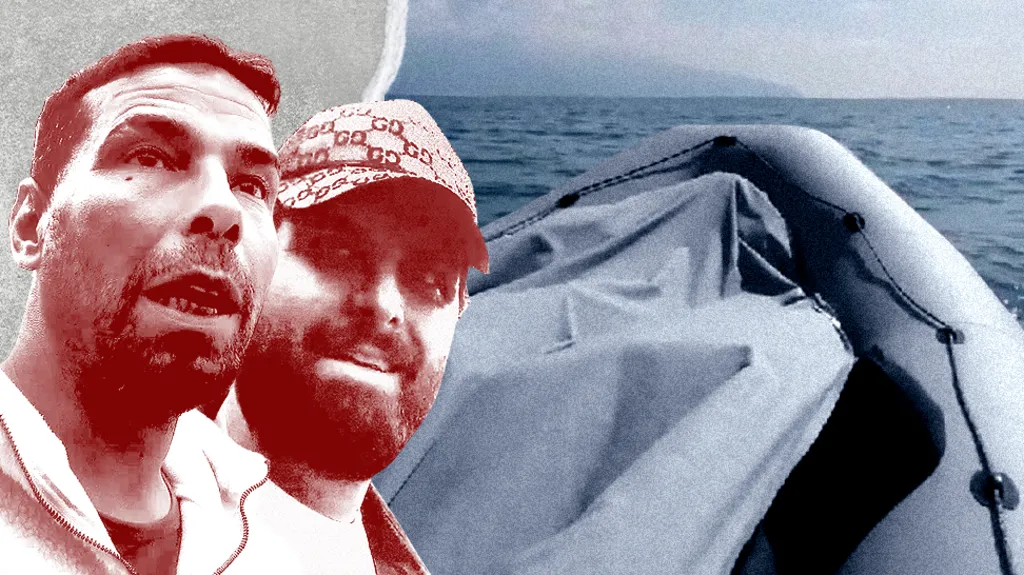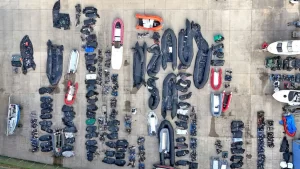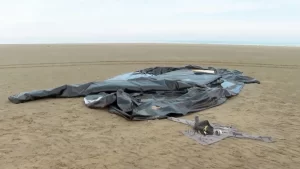
An undercover investigation has revealed alarming insights into the thriving human smuggling trade operating from Germany, particularly targeting perilous crossings of the English Channel. In a city like Essen, where many migrants gather, smugglers are offering packages that promise to facilitate dangerous journeys across one of the world’s busiest waterways.
The operation, exposed over a five-month investigation, highlights Germany’s pivotal role in storing boats and equipment used for illegal Channel crossings, a connection underscored by Britain’s National Crime Agency. As the UK government intensifies its efforts to dismantle these smuggling networks, Germany has emerged as a key location where smugglers can hide their operations.
During the undercover operation, a BBC journalist, who we’ll refer to as Hamza for safety reasons, approached a smuggler named Abu Sahar. The offer on the table included an inflatable dinghy, an outboard motor, and life jackets—all for the price of €15,000 (£12,500). Despite the dangers associated with such crossings, including the record number of fatalities this year, the allure of reaching the UK remains strong for many migrants.

Small boats and outboard motors in various states of disrepair used by people thought to be migrants to cross the Channel.
Hamza had been communicating with Sahar for months via WhatsApp and arranged a meeting to inspect the boat. However, the smuggler quickly deemed it too risky to visit the warehouse where the boats were stored, despite its proximity. Sahar cited “safety” as a reason for avoiding a warehouse visit, emphasizing the need for discretion in their dealings.
Essen’s location is strategic; it’s just a few hours from Calais, making it convenient for transporting boats while evading tighter surveillance in northern France. Interestingly, German law allows for the facilitation of smuggling to non-EU countries like the UK, complicating efforts to crack down on these operations.
During a meeting in a café, Hamza and Sahar were joined by another smuggler, known as “al-Khal.” This individual appeared to wield considerable influence and operated under a cloak of secrecy. The two smugglers disclosed their operation’s scale, mentioning around ten warehouses in the Essen area, a tactic to mitigate the impact of police raids. They spoke candidly about their ability to transport boats to Calais within hours, showcasing a boldness that reflects their operational confidence.
The investigation also sheds light on the methods used to finance these ventures. Khal mentioned that payments could be made via the informal Hawala system, a network that facilitates money transfer without relying on traditional banking systems. This approach not only speeds up transactions but also makes tracking much more challenging for authorities.

Despite the smugglers’ reassurances, experts warn that the boats they offer are extremely unsafe. Neil Dalton, chair of the National Independent Lifeboat Association, characterized one of the boats as a “death trap,” underscoring the dire risks involved in such crossings.
In response to the growing issue of human trafficking, authorities from both the UK and Germany have begun collaborating more closely. Recent raids in Germany have resulted in arrests and seizures of equipment, with UK officials expressing optimism about improving cooperation. However, frustrations persist regarding legal loopholes that allow smugglers to operate with relative impunity in Germany.
The BBC investigation not only highlights the dire consequences of this human smuggling trade but also underscores the deep-rooted issues that continue to plague migrants seeking a better life. The risks they face are monumental, yet desperation drives many to gamble their lives for the possibility of a future in the UK.
As authorities work to combat these networks, the stakes remain high. The remnants of failed crossings—abandoned dinghies and life jackets—serve as grim reminders of the perilous journeys undertaken by those hoping to escape their circumstances. The ongoing trade in human misery persists, evolving and adapting to legal and enforcement challenges, creating a tragic cycle that continues to endanger lives along Europe’s shores.
In the aftermath of the investigation, efforts to hold smugglers accountable and disrupt their operations will be critical in addressing this urgent humanitarian crisis.





